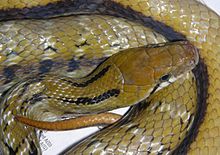- Coelognathus helena
-
Trinket Snake Trinket Snake from North Bengal, India Scientific classification Kingdom: Animalia Phylum: Chordata Class: Reptilia Order: Squamata Suborder: Serpentes Family: Colubridae Subfamily: Colubrinae Genus: Coelognathus Species: C. helenus Binomial name Coelognathus helenus
(Daudin, 1803)Synonyms - Coluber helena Daudin, 1803
- Elaphe helena (Daudin, 1803)
Trinket Snake, Coelognathus helenus, is a non-venomous constrictor species of colubrid snake native to south Central Asia.
Contents
Distribution
Sri Lanka, Southern India, Pakistan (Sind), Nepal, Bangladesh Type locality: India: Vishakhapatnam (Daudin, 1803).
Description
- See snake scales for terms used
Rostral a little broader than deep, visible from above; suture between the internasals much shorter than that between the prefrontals; frontal as long as its distance from the end of the snout, shorter than the parietals; loreal somewhat longer than deep; one large preocular; two postoculars; temporals 2+2 or 2+3: 9 (exceptionally 10 or 11) upper labials, fifth and sixth, or fourth, firth, and sixth entering the eye; 5 or 6 lower labials in contact with the anterior chin-shields, which are as long as or a little longer than the posterior. Scales in 23 to 27 rows, smooth, or feebly keeled on the posterior part of the body and on the tail. Ventrals 220-265; anal entire; subcaudals 75-94. Young pale brown above, with black cross bands, each enclosing four to six white ocelli; adult darker brown, with transverse series of squarish black spots, or with more or less distinct traces of the livery of the young; a vertical black streak below the eye, and an oblique one behind the eye; some specimens have a white, black-edged collar, others two black longitudinal streaks on the head; others, again, are intermediate in this respect. Lower parts yellowish, with or without a few small black spots, sometimes with a more or less distinct festooned marking on each side.[1] Total length 4.5 feet; tail 10 inches.
Elaphe helena monticollaris is a subspecies.
Photos
Notes
- ^ Boulenger, G. A. (1890) Fauna of British India. Reptilia and Batrachia.
References
- Boulenger, George A. 1894 Catalogue of the Snakes in the British Museum (Natural History). Volume II., Containing the Conclusion of the Colubridæ Aglyphæ. British Mus. (Nat. Hist.), London, xi, 382 pp.
- Daudin, F. M. 1803 Histoire Naturelle Generale et Particuliere des Reptiles. Vol. 6. F. Dufart, Paris.
- Helfenberger, Notker 2001 Phylogenetic relationship of Old World Ratsnakes based on visceral organ topography, osteology, and allozyme variation. Russ. J. Herpetol. (Suppl.), 56 pp.
- Kornacker, P. 1986 Die indische Schmucknatter. Herpetofauna 8 (44): 10
- Kornacker, P. 1988 Bemerkungen zur Biologie, Haltung Zucht von Elaphe helena (Daudin 1802). Herpetofauna 10 (57): 27-33
- Mehta, R.S. 2003 Prey-handling behavior of hatchling Elaphe helena (Colubridae). Herpetologica 59 (4): 469-474
- Niehaus, Guido;Schulz, Klaus-Dieter 1987 Die hinterasiatischen Kletternattern der Gattung Elaphe. Teil XI Elaphe helena (Daudin, 1803). Sauria 9 (4): 3-7
- Schulz, K. D. 1996 Eine Monographie der Schlangengattung Elaphe Fitzinger. Bushmaster, Berg (CH): 1-460
- Schulz, Klaus-Dieter 1996 A monograph of the colubrid snakes of the genus Elaphe Fitzinger. Koeltz Scientific Books, 439 pp.
- Utiger, Urs, Notker Helfenberger, Beat Schätti, Catherine Schmidt, Markus Ruf and Vincent Ziswiler 2002 Molecular systematics and phylogeny of Old World and New World ratsnakes, Elaphe Auct., and related genera (Reptilia, Squamata, Colubridae). Russ. J. Herpetol. 9 (2): 105-124.
External links
Images
Categories:- Colubrids
- Reptiles of Asia
- Reptiles of Pakistan
Wikimedia Foundation. 2010.





